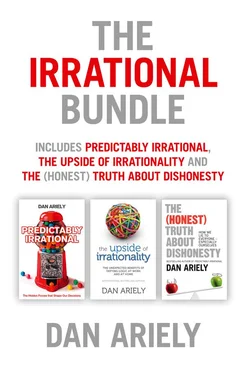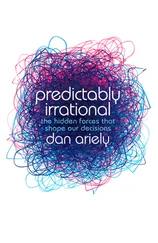Dan Ariely - The Irrational Bundle
Здесь есть возможность читать онлайн «Dan Ariely - The Irrational Bundle» — ознакомительный отрывок электронной книги совершенно бесплатно, а после прочтения отрывка купить полную версию. В некоторых случаях можно слушать аудио, скачать через торрент в формате fb2 и присутствует краткое содержание. Жанр: unrecognised, на английском языке. Описание произведения, (предисловие) а так же отзывы посетителей доступны на портале библиотеки ЛибКат.
- Название:The Irrational Bundle
- Автор:
- Жанр:
- Год:неизвестен
- ISBN:нет данных
- Рейтинг книги:3 / 5. Голосов: 1
-
Избранное:Добавить в избранное
- Отзывы:
-
Ваша оценка:
- 60
- 1
- 2
- 3
- 4
- 5
The Irrational Bundle: краткое содержание, описание и аннотация
Предлагаем к чтению аннотацию, описание, краткое содержание или предисловие (зависит от того, что написал сам автор книги «The Irrational Bundle»). Если вы не нашли необходимую информацию о книге — напишите в комментариях, мы постараемся отыскать её.
The Irrational Bundle — читать онлайн ознакомительный отрывок
Ниже представлен текст книги, разбитый по страницам. Система сохранения места последней прочитанной страницы, позволяет с удобством читать онлайн бесплатно книгу «The Irrational Bundle», без необходимости каждый раз заново искать на чём Вы остановились. Поставьте закладку, и сможете в любой момент перейти на страницу, на которой закончили чтение.
Интервал:
Закладка:
In the end, we tried another sort of experiment, one that smacked of reincarnation. In this condition, a door would still disappear if it was not visited within 12 clicks. But it wasn’t gone forever. Rather, a single click could bring it back to life. In other words, you could neglect a door without any loss. Would this keep our participants from clicking on it anyhow? No. To our surprise, they continued to waste their clicks on the “reincarnating” door, even though its disappearance had no real consequences and could always be easily reversed. They just couldn’t tolerate the idea of the loss, and so they did whatever was necessary to prevent their doors from closing.
HOW CAN WE unshackle ourselves from this irrational impulse to chase worthless options? In 1941 the philosopher Erich Fromm wrote a book called Escape from Freedom. In a modern democracy, he said, people are beset not by a lack of opportunity, but by a dizzying abundance of it. In our modern society this is emphatically so. We are continually reminded that we can do anything and be anything we want to be. The problem is in living up to this dream. We must develop ourselves in every way possible; must taste every aspect of life; must make sure that of the 1,000 things to see before dying, we have not stopped at number 999. But then comes a problem—are we spreading ourselves too thin? The temptation Fromm was describing, I believe, is what we saw as we watched our participants racing from one door to another.
Running from door to door is a strange enough human activity. But even stranger is our compulsion to chase after doors of little worth—opportunities that are nearly dead, or that hold little interest for us. My student Dana, for instance, had already concluded that one of her suitors was most likely a lost cause. Then why did she jeopardize her relationship with the other man by continuing to nourish the wilting relationship with the less appealing romantic partner? Similarly, how many times have we bought something on sale not because we really needed it but because by the end of the sale all of those items would be gone, and we could never have it at that price again?
THE OTHER SIDE of this tragedy develops when we fail to realize that some things really are disappearing doors, and need our immediate attention. We may work more hours at our jobs, for instance, without realizing that the childhood of our sons and daughters is slipping away. Sometimes these doors close too slowly for us to see them vanishing. One of my friends told me, for instance, that the single best year of his marriage was when he was living in New York, his wife was living in Boston, and they met only on weekends. Before they had this arrangement—when they lived together in Boston—they would spend their weekends catching up on work rather than enjoying each other. But once the arrangement changed, and they knew that they had only the weekends together, their shared time became limited and had a clear end (the time of the return train). Since it was clear that the clock was ticking, they dedicated the weekends to enjoying each other rather than doing their work.
I’m not advocating giving up work and staying home for the sake of spending all your time with your children, or moving to a different city just to improve your weekends with your spouse (although it might provide some benefits). But wouldn’t it be nice to have a built-in alarm, to warn us when the doors are closing on our most important options?
SO WHAT CAN we do? In our experiments, we proved that running helter-skelter to keep doors from closing is a fool’s game. It will not only wear out our emotions but also wear out our wallets. What we need is to consciously start closing some of our doors. Small doors, of course, are rather easy to close. We can easily strike names off our holiday card lists or omit the tae kwon do from our daughter’s string of activities.
But the bigger doors (or those that seem bigger) are harder to close. Doors that just might lead to a new career or to a better job might be hard to close. Doors that are tied to our dreams are also hard to close. So are relationships with certain people—even if they seem to be going nowhere.
We have an irrational compulsion to keep doors open. It’s just the way we’re wired. But that doesn’t mean we shouldn’t try to close them. Think about a fictional episode: Rhett Butler leaving Scarlett O’Hara in Gone with the Wind, in the scene when Scarlett clings to him and begs him, “Where shall I go? What shall I do?” Rhett, after enduring too much from Scarlett, and finally having his fill of it, says, “Frankly, my dear, I don’t give a damn.” It’s not by chance that this line has been voted the most memorable in cinematographic history. It’s the emphatic closing of a door that gives it widespread appeal. And it should be a reminder to all of us that we have doors—little and big ones—which we ought to shut.
We need to drop out of committees that are a waste of our time and stop sending holiday cards to people who have moved on to other lives and friends. We need to determine whether we really have time to watch basketball and play both golf and squash and keep our family together; perhaps we should put some of these sports behind us. We ought to shut them because they draw energy and commitment away from the doors that should be left open—and because they drive us crazy.
SUPPOSE YOU’VE CLOSED so many of your doors that you have just two left. I wish I could say that your choices are easier now, but often they are not. In fact, choosing between two things that are similarly attractive is one of the most difficult decisions we can make. This is a situation not just of keeping options open for too long, but of being indecisive to the point of paying for our indecision in the end. Let me use the following story to explain.
A hungry donkey approaches a barn one day looking for hay and discovers two haystacks of identical size at the two opposite sides of the barn. The donkey stands in the middle of the barn between the two haystacks, not knowing which to select. Hours go by, but he still can’t make up his mind. Unable to decide, the donkey eventually dies of starvation. * Конец ознакомительного фрагмента. Текст предоставлен ООО «ЛитРес». Прочитайте эту книгу целиком, купив полную легальную версию на ЛитРес. Безопасно оплатить книгу можно банковской картой Visa, MasterCard, Maestro, со счета мобильного телефона, с платежного терминала, в салоне МТС или Связной, через PayPal, WebMoney, Яндекс.Деньги, QIWI Кошелек, бонусными картами или другим удобным Вам способом.
This story is hypothetical, of course, and casts unfair aspersions on the intelligence of donkeys. A better example might be the U.S. Congress. Congress frequently gridlocks itself, not necessarily with regard to the big picture of particular legislation—the restoration of the nation’s aging highways, immigration, improving federal protection of endangered species, etc.—but with regard to the details. Often, to a reasonable person, the party lines on these issues are the equivalent of the two bales of hay. Despite this, or because of it, Congress is frequently left stuck in the middle. Wouldn’t a quick decision have been better for everybody?
Here’s another example. One of my friends spent three months selecting a digital camera from two nearly identical models. When he finally made his selection, I asked him how many photo opportunities had he missed, how much of his valuable time he had spent making the selection, and how much he would have paid to have digital pictures of his family and friends documenting the last three months. More than the price of the camera, he said. Has something like this ever happened to you?
Читать дальшеИнтервал:
Закладка:
Похожие книги на «The Irrational Bundle»
Представляем Вашему вниманию похожие книги на «The Irrational Bundle» списком для выбора. Мы отобрали схожую по названию и смыслу литературу в надежде предоставить читателям больше вариантов отыскать новые, интересные, ещё непрочитанные произведения.
Обсуждение, отзывы о книге «The Irrational Bundle» и просто собственные мнения читателей. Оставьте ваши комментарии, напишите, что Вы думаете о произведении, его смысле или главных героях. Укажите что конкретно понравилось, а что нет, и почему Вы так считаете.












